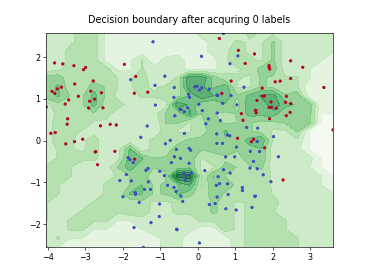skactiveml.pool.TypiClust#
- class skactiveml.pool.TypiClust(missing_label=nan, random_state=None, cluster_algo=<class 'sklearn.cluster._kmeans.KMeans'>, cluster_algo_dict=None, n_cluster_param_name='n_clusters', k=5)[source]#
Bases:
SingleAnnotatorPoolQueryStrategyTypical Clustering
This class implements the Typical Clustering (TypiClust) query strategy [1], which considers both diversity and typicality (representativeness) of the samples.
- Parameters
- missing_labelscalar or string or np.nan or None, default=np.nan
Value to represent a missing label.
- random_stateNone or int or np.random.RandomState, default=None
The random state to use.
- cluster_algoClusterMixin.__class__, default=KMeans
The cluster algorithm to be used.
- cluster_algo_dictdict, optional (default=None)
The parameters passed to the clustering algorithm cluster_algo, excluding the parameter for the number of clusters.
- n_cluster_param_namestring, default=”n_clusters”
The name of the parameter for the number of clusters.
- kint, default=5
The number for k-nearest-neighbors for the computation of typicality.
References
- 1
G. Hacohen, A. Dekel, und D. Weinshall, “Active Learning on a Budget: Opposite Strategies Suit High and Low Budgets”, ICML, 2022.
Methods
Get metadata routing of this object.
get_params([deep])Get parameters for this estimator.
query(X, y[, candidates, batch_size, ...])Query the next samples to be labeled
set_params(**params)Set the parameters of this estimator.
- get_metadata_routing()#
Get metadata routing of this object.
Please check User Guide on how the routing mechanism works.
- Returns
- routingMetadataRequest
A
MetadataRequestencapsulating routing information.
- get_params(deep=True)#
Get parameters for this estimator.
- Parameters
- deepbool, default=True
If True, will return the parameters for this estimator and contained subobjects that are estimators.
- Returns
- paramsdict
Parameter names mapped to their values.
- query(X, y, candidates=None, batch_size=1, return_utilities=False)[source]#
Query the next samples to be labeled
- Parameters
- Xarray-like of shape (n_samples, n_features)
Training data set, usually complete, i.e., including the labeled and unlabeled samples.
- yarray-like of shape (n_samples, )
Labels of the training data set (possibly including unlabeled ones indicated by self.missing_label)
- candidatesNone or array-like of shape (n_candidates), dtype = int or
- array-like of shape (n_candidates, n_features), optional (default=None)
If candidates is None, the unlabeled samples from (X, y) are considered as candidates. If candidates is of shape (n_candidates) and of type int, candidates is considered as a list of the indices of the samples in (X, y). If candidates is of shape (n_candidates, n_features), the candidates are directly given in the input candidates (not necessarily contained in X).
- batch_sizeint, optional(default=1)
The number of samples to be selects in one AL cycle.
- return_utilitiesbool, optional(default=False)
If True, also return the utilities based on the query strategy
- Returns
- query_indicesnp.ndarray of shape (batch_size,)
The query_indices indicate for which candidate sample a label is to queried, e.g., query_indices[0] indicates the first selected sample. If candidates in None or of shape (n_candidates), the indexing refers to samples in X. If candidates is of shape (n_candidates, n_features), the indexing refers to samples in candidates.
- utilitiesnumpy.ndarray of shape (batch_size, n_samples) or
- np.ndarray of shape (batch_size, n_candidates)
The utilities of samples for selecting each sample of the batch. Here, utilities mean the typicality in the considered cluster. If candidates is None or of shape (n_candidates), the indexing refers to samples in X. If candidates is of shape (n_candidates, n_features), the indexing refers to samples in candidates.
- set_params(**params)#
Set the parameters of this estimator.
The method works on simple estimators as well as on nested objects (such as
Pipeline). The latter have parameters of the form<component>__<parameter>so that it’s possible to update each component of a nested object.- Parameters
- **paramsdict
Estimator parameters.
- Returns
- selfestimator instance
Estimator instance.
